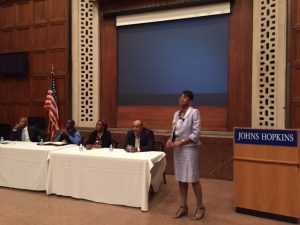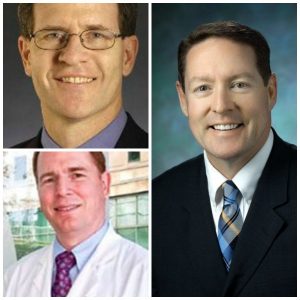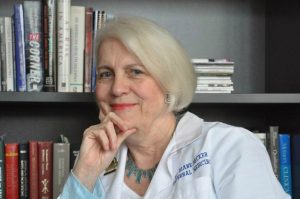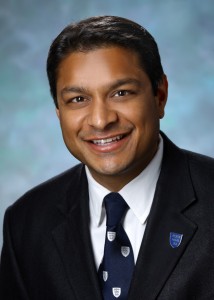It is with great satisfaction and immense gratitude that I take this opportunity to summarize my first year in the Department of Medicine at Johns Hopkins University. This was a year of many events both good and arresting. It did not fail to disappoint in providing exciting opportunities, unexpected challenges and many twists and turns. Most enjoyable and most memorable for me has been the opportunity to meet and learn about many of you. In addition to spending the major portion of my time at our Broadway and Bayview campuses, I was fortunate to visit our faculty and meet with hospital and administrative leaders at Sibley, Suburban, Howard County, EBMC, GBMC, Greenspring Station and White Marsh. I am inspired by the passion you bring to your careers and feel a deep sense of pride and humility in the department’s responsibility to aid you in your clinical, educational and scholarly aspirations. I am very pleased to affirm, through personal contacts and experiences, that our faculty is enormously talented, convivial and motivated by a desire to advance our departmental missions.

The unrest in Baltimore made it clear that our traditional concepts of academic success are insufficient to accomplish our tripartite mission. We need to more effectively engage our community in order to achieve and sustain the impact of our work. Our department is vast and diverse, so a good place to start is by learning more about the persons we work with every day. We are all busy, but cannot be too busy to involve one another in conversation and to learn about the stories of the people we work with on a daily basis. I was uplifted by the coming together of our university and school in response to the riots and by the broad participation of our staff, faculty and employees in our Journeys in Medicine series. I want to give special thanks to the leaders of this important series, Drs. Sherita Golden, Lisa Cooper, Deidra Crews, Diane Becker, Chiadi Ndumele, Ms. Tamala Knox and Ms. Hailey James, our panelists and those of you who attended. This series began a deliberate discussion about race and provided direction for how we can become more involved with our community. The department has developed several new initiatives, including financial support for MERIT, an organization dedicated to fostering biomedical and health-related careers for under-privileged youth in Baltimore and a new award for community involvement and civic leadership to be given out in 2016. In addition, Dr. Golden is representing the department on the JHM and Baltimore Dean’s Office Youth Mentoring Task Force. We are committed to continuing this process as we wish for better days for our country, city and neighborhood.
When I began the academic year, I had the opportunity to present at Grand Rounds. At that time, I pledged that I would do eight things. These were to meet and listen, to recruit and retain the best faculty, to raise money, to define clinical FTE for our practices, to form a broadly representative departmental compensation committee, develop a transparent compensation model, review AVC/VC positions and consider new positions to lead our department into the future. With your help, we have made important progress on each of these goals.

Our greatest resource is people. During the past year, the department has recruited 65 new faculty, while 49 faculty have retired or left resulting in a faculty of 602. We recruited new permanent division directors in Clinical Pharmacology and Pulmonary and Critical Care Medicine. Dr. Craig Hendrix, an expert in viral prophylaxis, and Dr. Jon Orens, a clinical program builder and researcher in lung transplant, have taken these important divisions and are building new programs for the future. We have active national searches for the next leaders of the divisions of Endocrinology, Diabetes and Metabolism and Allergy and Clinical Immunology, and I am optimistic we will be able to recruit outstanding candidates to lead these divisions. In addition, I am pleased to welcome Ron Langlotz as the new director of Nursing and a key partner to leading our department into a future marked by increasing prominence of team-based healthcare. My impression at this point is recruitment to Hopkins is advantaged by the success and welcoming nature of our faculty and by the tremendous range of opportunities of professional advancement and discovery.
This year has been a banner year for development. We have raised $44 million, and I am very grateful to our donors, at all levels, for their generous support. I am pleased that Ms. Ashlyn Sowell (410-955-9880 or [email protected]) accepted the lead position in development for the Department of Medicine. She has already met with many of you and is directing a talented team of development officers who I encourage you to reach out to as you are contacted by grateful patients and consider new and innovative ways of directing revenue to support our missions.
The Board of Trustees and the School of Medicine have asked departments to focus on compensation structures, and a great deal of time and effort has already gone into this process in our department. I am pleased and grateful to have the help of you, the faculty, as well as assistance of key stakeholders such as the Women’s Task Force and the Diversity Council. Dr. Diane Becker and her team led an unprecedented effort to analyze all the salary data with an eye to promoting salary equity between men and women and races underrepresented in medicine. Acting on these new data, our team is already in the process of meeting each division director and administrator to review, on a case-by-case basis, salary across ranks and divisions to ensure equal pay for equal work. I am impressed with the energy, sophistication and cooperation around this process, and I look forward to the opportunity to communicate and to hear your thoughts and concerns about this evolving process as the year unfolds. My goal is that by early next year we will have a late stage beta version of our productivity-based financial model that will be available for review by individual faculty. As a first step in this process, all faculty should have received a first annual salary letter that is signed by me, Dr. Hellmann and your Division Director.
The development of this model is huge undertaking, and in particular, I want to thank Amanda VanderZyl, the interim administrator for our department, Douglas Brooks, our director of finance, Matt Lautzenheiser, the director of clinical operations, the division directors, divisional administrators, Dr. Sherita Golden and the other vice-chairs for their hard work in various critical tasks, such as building descriptions of clinical FTE, curating our financial records so we could generate faculty salary letters and creating faculty templates for mapping revenue to effort. I also want to thank all faculty who attended or watched the faculty forums dedicated to the compensation plan. Finally, I want to thank the members of the compensation committee in advance for the work they will do over the coming year to craft and communicate our compensation plan, so it can be trialed early next year and implemented by next July.
This year was notable because all the vice-chair and associate chair positions were examined and provided with new job descriptions. All but three (Vice-Chair for Education- Dr. Sanjay Desai, Vice-Chair for Clinical Affairs – Dr. Lee Biddison and Associate Vice-Chair for Inpatient Operations – Carrie Herzke) were presented as requests for applications. This transparent process of selecting our department’s leadership has led to a strong and diverse group of leaders in our department who are already having an impact on each of our mission-based activities. I want to thank the prior leadership team for their service to the department and for their grace and support during this year’s busy transition.
There are lots of moving pieces and enough threats to disturb one’s sleep from time to time. But despite this, the future is bright for our department in no small measure because of the pool of highly talented and energetic trainees that wash up on our shores each year. With an eye to keeping our programs fresh and relevant, I have been working with Dr. Sanjay Desai and other educational leaders to build intellectual interest communities in our residency. These will represent some of the key themes that cut across our legendary firms. I am pleased to announce that this year we recruited an inaugural class of residents with an explicit interest in being mentored to become physician-scientists or with plans to pursue a career in global health.
In summary, I am pleased with our progress this year and thank you for your support, advice and constructive criticism. Next year will, of course, bring many opportunities and challenges. In broad strokes, my hope is that we can focus on sustaining and improving success in our missions, improving equity and transparency, advancing communication between all departmental employees, enhancing community engagement and furthering integration of our health system.

